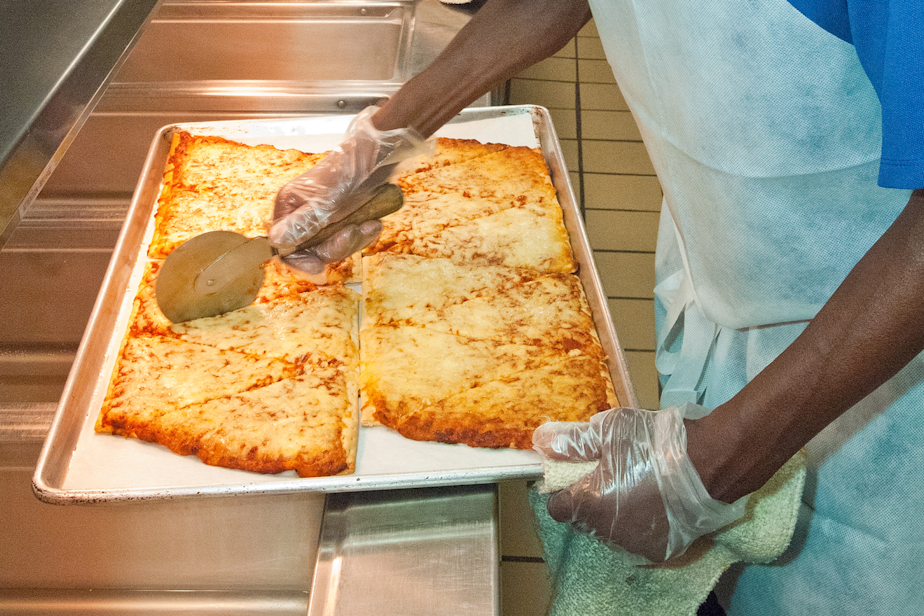My high school doesn’t serve halal meat. Here’s why I wish it did

Some Washington school leaders want to make school lunch free for all students. But schools are not required to offer meals that accommodate students’ religious beliefs, like kosher or halal meals.
RadioActive's Rahmah Abdulazeez looked into how not having many halal lunch options at school affects Muslim students like her.
[RadioActive Youth Media is KUOW's radio journalism and audio storytelling program for young people. This story was entirely youth-produced, from the writing to the audio editing.]
A
s a sophomore at Kent-Meridian High School in Kent, who’s also Muslim, I can tell you: School lunch is hard.
Picture this: You’re running to the cafeteria. It’s crowded. You finally make it to the front of the line, and take a peek at the menu. The main entrée today is a barbecue chicken wrap. But for Muslim students who eat halal, you only have a few options: like the last piece of cheese pizza, or the PB&J. Those options don't have a lot of protein, and they're not great to eat every single day.
Food that’s halal is food that is permissible according to the rules of Islam. Pork is never halal, but meat like chicken and beef can be halal, depending on how the animal was raised, slaughtered, and prepared. Students who eat halal can eat vegetarian meals, but there’s just not a lot of options at school.
Sponsored
I talked to other Muslim students at Kent-Meridian High School who eat halal to find out what they have for lunch. Randa Suleiman said she goes to Starbucks most days instead of eating in the cafeteria. Tiya Sethi said she eats cheese pizza every day, because it's the only halal option. And Ramla Abdi, Khadija Muhammed, Sereen Hashmi and Ali Murtada all said they usually skip lunch completely.
All this got me thinking: How does the lack of halal lunch options affect Muslim students?
(And it's not like Muslim students are a small group. Kent-Meridian High School is one of the most racially diverse high schools in the state, and it has a huge Muslim population.)
Sarar Al-Nuaimi is a Muslim student who goes to Kent-Meridian and eats halal. He says the limited halal options at school can affect our school performance.
Sponsored
"Let's say you get hungry, you can't think straight in class," Al-Nuaimi said. "You might feel really tired. That might get you distracted. Or you might get anxiety."
Another Kent-Meridian student, Hamza Ahmed, agrees.
“Usually, on the days where the school provides halal options and I do eat lunch, I feel like I’m able to tackle a lot more work," Ahmed said. "I'm way more energetic, rather than the days where I don't eat lunch. I just start to feel way more tired way earlier and I feel like I'm less productive.”
Personally, I get so much anxiety when I don’t eat lunch. I get so tired, and I can’t stay awake in class at all.
Some students go off campus to nearby restaurants or stores for lunch, but it’s expensive, not everyone is allowed to leave campus, and there’s no guarantee you’ll find halal options. For me, I can choose between Starbucks, Subway, or a gas station.
Sponsored
And if you don’t have money? Well, a lot of us know which teacher has a snack drawer with halal snacks that she spends her own money on.
It is possible for schools to serve lunches that meet religious guidelines, federal nutrition standards, and student tastes. Public schools in New York and Michigan have piloted lunch programs where the entire menu is halal.
If it were up to me, Washington schools would offer meals that are inclusive and culturally diverse, because all students deserve to eat school lunch without compromising their beliefs.
This story was produced in a RadioActive Youth Media workshop for high school and college-age youth. Production assistance by Noel Gasca and Kelsey Kupferer. Edited by Mary Heisey. Prepared for the web by Kelsey Kupferer.
Find RadioActive on Instagram, Twitter, TikTok, YouTube and Facebook, and on the RadioActive podcast.
Sponsored
Support for KUOW's RadioActive comes from the Bill & Melinda Gates Foundation Discovery Center and BECU.
If you have any feedback on this story, you can email RadioActive at radioactive@kuow.org, or click the teal feedback tab on the edge of this page. Reach out, we're listening.



